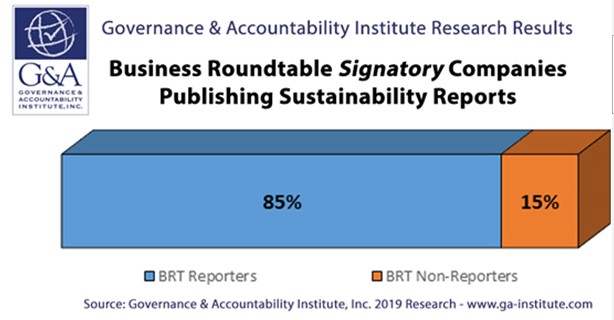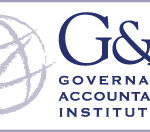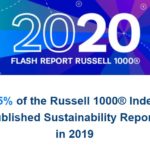
In August 2019, almost all the Business Roundtable CEO members (181) signed on to an updated BRT definition of “the purpose of a corporation” which expanded the definition to include a focus on other stakeholders other than investors Following this announcement, Governance & Accountability Institute’s research team examined the ESG / sustainability reporting practices of the BRT signatory corporations to examine trends and create a baseline for tracking progress and actions going forward. Today, G&A released these initial benchmark results in a resource paper available on it’s website.
The original definition followed the Professor Milton Friedman doctrine from the 1970s which said — “…the paramount duty of management and of boards of directors is to the corporation’s stockholders.” The BRT’s updated statement is very different from that approach and embraces the idea that stakeholders really do matter (also including shareholders). The BRT’s updated statement of purpose includes commitments to customers, employees, suppliers, communities, and shareholders. Each of these is “essential,” say the CEO signatories, who commit “to deliver value to all, for the future success of the companies, our communities and our country.”
Highlights
- 93% (181 of 193) of BRT member companies’ CEOs are signatories to the updated statement of corporate purpose (at time of research in November 2019)
- 93% (150 of 160) of CEOs of public company members signed on
- 94% (31 of 33) of CEOs of privately-owned company members signed on
- 85% (154 of 181) of CEO signatories’ companies publish sustainability /ESG reports
- 15% (27 of 181) of companies are signatories — but not yet publishing reports
G&A’s resource paper includes:
- Additional perspectives from G&A
- Detailed analysis of reporting practices
(such as trends in usage of reporting standards like GRI, SASB, TCFD, and the SDGs) - Links to external resources
Download G&A’s resource paper (on request)
G&A Institute Chairman & CEO Hank Boerner notes: “The January 2019 communication to corporate CEOs by Larry Fink, CEO of BlackRock, head of the world’s largest asset manager and himself a signatory of the BRT statement in August, was an important catalyst in the widening discussion on the role of the large company in the broader society. The BRT statement provided an important focal point for joining in the conversation by stakeholders, including investors. As that discussion continues, we believe it is helpful to understand what the signatories’ companies are doing in terms of ‘walking-the-talk’ of purpose and one way to do this is to examine the public reporting activities.”
Louis D. Coppola, Executive Vice President & Co-Founder of G&A Institute, who designs and manages the corporate reporting research and analysis, adds: “We congratulate the CEOs who have made this commitment through BRT and we look forward to tracking the progress of these companies on aspects of these commitments.
“It makes sense that these CEOs have now taken this new wider view on the purpose of a corporation, especially as an increasing number of investors are understanding and factoring key ESG data points into their strategy-setting and decision-making. This inaugural report from G&A Institute on the BRT signatories serves as the initial benchmark to examine future progress and momentum for companies in these areas!”
Led by G&A Institute’s Senior ESG Analyst/ Team Leader Elizabeth Peterson, G&A’s research team of talented analyst interns made significant contributions to this study and we proudly recognize them: Julia Nehring, Reilly Sakai, and supporting analyst Yuyou Chen.
G&A plans to continue to track the public disclosure and reporting activities of the BRT companies to detect trends and will share results periodically.




